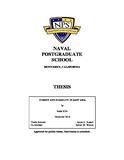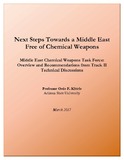U.S. security policy in Asia after Korean unification

Download
Author
Ahern, Bryan M
Date
1997-12Advisor
Olsen, Edward A.
Second Reader
Callahan, Mary P.
Metadata
Show full item recordAbstract
The U.S. has pursued three policy objectives in Asia since World War II. They are 1) freedom of the seas; 2) access to the markets of the region; and 3) preventing the domination of the region by any single power. To achieve these goals, the U.S. has committed to maintain 100,000 forward deployed troops in Asia. Currently, 37,000 are stationed in South Korea. North Korea is in crisis. Seven years of negative GDP growth, severe food shortages, several high level defections and North Korea's political isolation all indicate that North Korea is on the verge of collapse. This thesis argues that the collapse of North Korea is imminent. Once Korea is unified under South Korea, the U.S. will not need 37,000 troops in Korea. When the U.S. withdraws its troops from Korea, a potential arms race could ensue. To prevent this, the U.S. should increase its naval presence after the withdrawal of American ground forces. The U.S. should consider the possibility of home porting a nuclear aircraft carrier in Korea. This proposed policy would solve the problem created by Japan's refusal to host U.S. nuclear powered aircraft carriers at a time when the U.S is retiring its conventional carriers.
Rights
This publication is a work of the U.S. Government as defined in Title 17, United States Code, Section 101. Copyright protection is not available for this work in the United States.Collections
Related items
Showing items related by title, author, creator and subject.
-
The Energy Seminar www.nps.edu/energy Energy Security and Foreign Policy: The Case of the Caspian
Shaffer, Brenda (2017-10-27);With Guest Lecturer Professor Brenda Shaffer, Center for Eurasian, Russian and Eastern European Studies (CERES), Georgetown University -
Turkey and stability in East Asia
Kilic, Sedat (Monterey, California: Naval Postgraduate School, 2016-12);East Asia is an important region for global stability. Major economies—China, Japan, and South Korea—are located in the region. The phenomenon of a rising China, the response of the United States to a rising China, and the ... -
Next steps towards a Middle East free of chemical weapons
Kittrie, Orde F. (Arizona State University, 2017-03);A “Track II” Middle East Chemical Weapons Task Force (Task Force) comprised of policy and technical experts from ten countries in the Middle East convened in 2016-17 to discuss chemical weapons acquisition and use in the ...


 ussecuritypolicy00aher.pdf (4.476Mb)
ussecuritypolicy00aher.pdf (4.476Mb)

